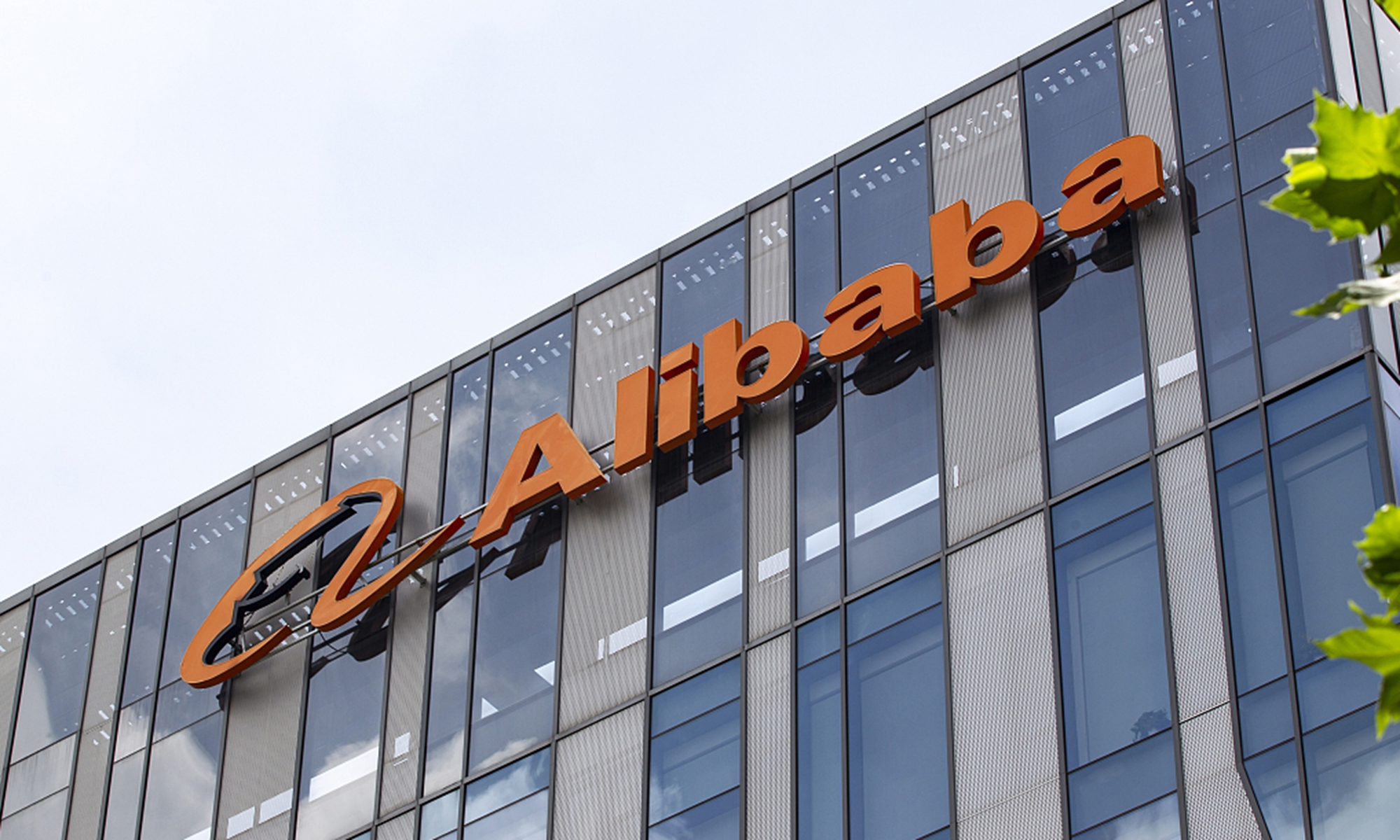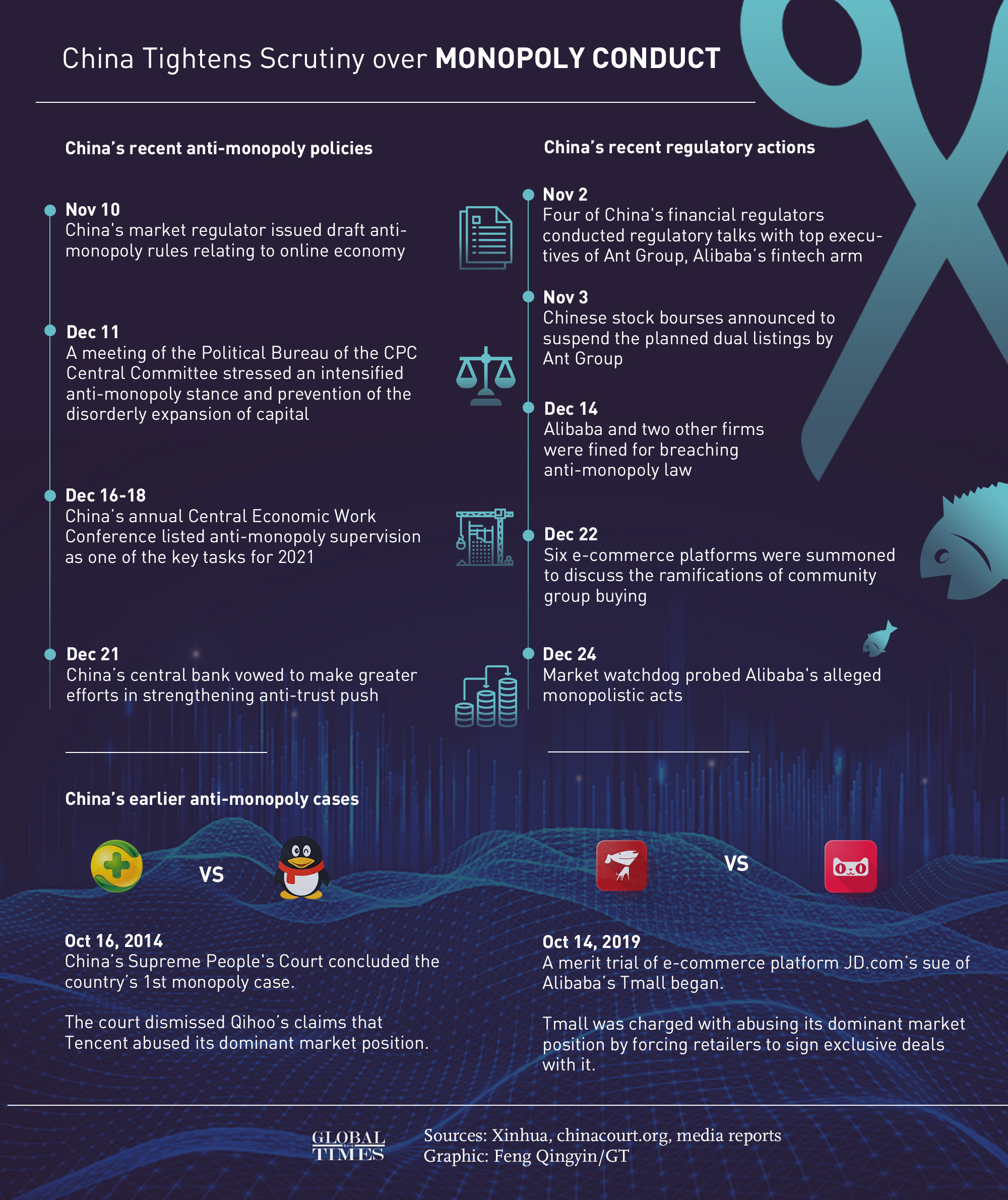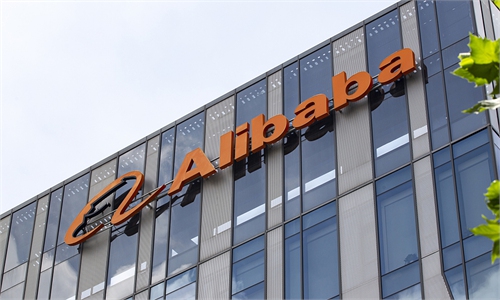
Alibaba Photo:VCG
China’s top market watchdog said on Thursday it has launched a probe into e-commerce giant Alibaba’s suspected monopolistic acts including forcing merchants to choose one platform between two competitors, in a move that is believed to aim at protecting consumers rights and fairness in market competition to ensure the sound and long-term development of a massive part of China's economy.
The antitrust probe into one of the world's largest e-commerce giants, which attracted widespread domestic and global attention, sends a powerful signal of top regulators' determination to rein in what officials call disorderly expansion of capital as part of a broad push to root out potential major risks for the economy, which remains on a steady recovery trajectory but also faces mounting internal and external risks.
The move, which came after years of efforts by policymakers to strengthen antitrust regulations and mounting concerns and call for action in the public, falls in line with a growing global trend of tightening regulations for big tech companies that wield mas-sive economic as well as social influence.
For Alibaba, the probe could mean deep re-form and shift in its business operations and could subject the e-commerce giant into an antitrust fine of up to tens of billions of yuan, according to legal experts and mar-ket observers.
The probe was based on tip-offs, the State Administration for Market Regulation (SAMR) said in a statement released on its website, without elaborating further.
The People’s Daily, a flagship newspaper in China, said in a commentary piece pub-lished on Thursday morning that the investigation is an important step in strengthen-ing anti-monopoly supervision in the internet sphere.
Tip-offs regarding platform monopoly have been on the rise, an indication of certain risks and hazards associated with online economic development, per the commentary.
Strengthening anti-monopoly enforcement commits the platform economy to a better development environment in the future, the commentary stressed. “This investigation does not mean that the country’s attitude toward the platform economy has changed.
On the contrary, it is good for the market and can enhance development of the Chi-nese economy.”
The news came on the heels of the annual tone-setting Central Economic Work Con-ference, which stressed that strengthening anti-monopoly regulation and preventing disorderly expansion of capital will be the top priorities for the coming year.
“It is good for the government to increase anti-monopoly regulation, which shows that regulators have made progress in improving the market,” Dong Dengxin, director of the Finance and Securities Institute at the Wuhan University of Science and Technol-ogy, told the Global Times on Thursday.
“Alibaba is a good example of China's private economy, and the authorities also have the duty to supervise and guide them to develop healthily and steadily,” Dong said.
It’s in the interest of a multitude of micro, small and medium-sized firms whose sur-vival is increasingly at the mercy of internet titans, critics said, regarding the toughen-ing of the antitrust as an effective effort aiding the nation’s broad-based moves to bail out smaller business striving to fare through the COVID-19-inflicted economic down-turn.
Antitrust regulatory toughening
Lauding the probe’s announcement as the latest in a slew of ramped-up antitrust ef-forts this year on the back of a multi-year endeavor to regulate the nation’s sprawling internet arena, observers expect China to be an increasingly important force in the global fight against the so-called Big Tech.
The forced “pick one out of two” to limit consumer choices substantiates Alibaba’s violation of the nation’s antitrust laws and regulations, Fang Xingdong, founder of Beijing-based technology think tank ChinaLabs, told the Global Times on Thursday.
China’s Anti-Monopoly Law which entered into force on August 1, 2008 stipulates that among the monopolistic behaviors are operators’ abuse of market dominance and the concentration of operators that might exclude and limit competition.
The SAMR and the Ministry of Commerce, in a meeting with leading e-commerce platforms on Tuesday, stressed that the authorities intend to step up supervision and clamp down on unfair competition in the community group-buying sector.
Alibaba was among six large internet firms participating in the Tuesday meeting that also included Tencent, JD.com Inc, Meituan, Pinduoduo and Didi Chuxing, the mar-ket watchdog said in the statement posted on its website.
The internet giants’ ever-expanding foray into the community group-buying sector has hit local penny-saving vegetable and fruit vendors, a vegetable vendor in Xuchang, Central China’s Henan Province, told the Global Times on Thursday.
A poll by Chinese news site ifeng.com including more than 800,000 netizens showed that as of December 18, 67.72 percent of the respondents believe that the involvement of internet titans in the community group-buying sector will cause vegetable vendors to lose their jobs and over 80 percent of the respondents think such acts are suspected of monopolizing and putting the survival of vegetable vendors at stake.
In another effort to rein in the unchecked expansion of capital, Alibaba Investment, Tencent-backed online literature platform China Literature and express locker solu-tions provider Shenzhen Hive Box Co were each fined 500,000 yuan ($76,465) earlier in December for breaching the country's Anti-monopoly Law.
Chinese lawmakers will deliberate revisions to the country’s Anti-monopoly Law, ac-cording to Yue Zhongming, spokesperson for the Legislative Affairs Commission of the National People's Congress (NPC) Standing Committee last week.
In November, the SAMR issued draft anti-monopoly rules relating to the country's online economy to enhance oversight of the country's giant online service platforms, and it solicited public comments as it took steps toward protecting consumers’ inter-ests.
The fast-paced regulatory toughening is based on years of efforts to defuse antitrust woes that have weighed in on the nation’s internet economy, increasingly a backbone of the Chinese economy.
Back in October 2014, the Supreme People's Court upheld a final verdict rejecting a lawsuit launched by anti-virus software provider Qihoo 360 against Tencent over al-leged market monopoly. The ruling put an end to the drawn-out legal battle between the two Chinese internet majors.
In another high-profile case, online retailer JD.com Inc sued Alibaba’s Tmall in late 2015 over forcing the choice between one of two that caused droves of sellers to complain and cry foul. The suit is still awaiting a final ruling.
While China remains less experienced in incorporating antitrust rules into its legal framework, especially for online business regulation compared with the US and the EU, the fresh move arguably lands the nation among major global powers in battling against Big Tech’s unchecked clout, Fang commented.
The US, the first to introduce an antitrust law worldwide, has stepped up antitrust probes into internet giants in recent years. The European Commission, for its part, un-veiled two legislative initiatives in mid-December – the Digital Services Act and the Digital Markets Act – aiming to curb unfair competition among big internet platforms.
Notably, technology heavyweights including Google, Apple, Facebook and Amazon have become the targets of anti-monopoly investigations globally over the past four years. The EU has fined Google in the three consecutive years from 2017 to 2019, with resultant penalties amounting to over $9 billion.
Alibaba heading for more sustainability
Standing in the center of the antitrust whirlwind, Alibaba and its fintech offshoot Ant Group are set to embrace tougher times yet a more sustainable future, analysts said.
In a statement through its official Sina Weibo account, Alibaba said it “will actively cooperate with regulators to complete the investigation,” adding the company’s busi-ness operations will remain unaffected.
A big part of the thousands of comments on the Weibo post called for the e-commerce giant to rectify improper market practices and voiced support for the na-tion’s antitrust drive.
Alibaba might be fined as much as 10 percent of its sales revenues for the past year, Fang said, citing the Anti-Monopoly Law that subjects violators that abuse their mar-ket dominance to confiscation of illegal gains as well as a fine of up to 10 percent of their prior-year sales revenues.
According to Alibaba’s annual fiscal disclosure in May, in the 12 months that ended on March 31, 2020, it raked in 509.71 billion yuan in revenues, up 35 percent year-on-year. That suggests a staggering fine of up to 50 billion yuan.
Ant Group, whose dual listings in Shanghai and Hong Kong were suspended amid regulatory toughening, also faces a more complicated pathway back to get listed, ana-lysts said, hailing the regulatory toughening as a must-have for the Alibaba ecosystem to embrace more sustainable growth.
The country’s central bank, the banking and insurance regulator, the securities regula-tor and the foreign exchange regulator will conduct regulatory talks with Ant Group within the next few days, according to a separate statement on the central bank’s website on Thursday.
The talks are expected to urge Ant Group to implement financial regulatory require-ments, hold onto fair competition and protect consumers’ legitimate rights, in accord-ance with market-oriented and law-based principles, thereby regulating the operation and development of financial businesses, the statement said.
Ant Group said on Thursday that it will abide by decisions made by financial regula-tors and strengthen internal compliance and management practices.

From the first anti-monopoly case between software developer Qihoo and Tencent in 2014 to the latest probe into Alibaba’s alleged monopolistic acts, China is dedicated to creating a better business environment for all of its market participants. Graphic:Feng Qingyin/GT



